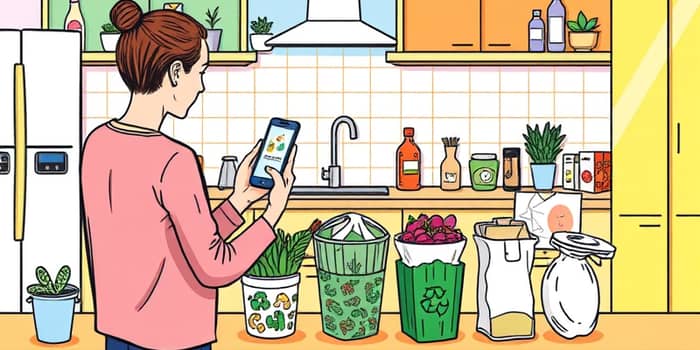In today’s fast-paced world, convenience often trumps sustainability. Yet, reducing waste need not mean sacrificing the ease and speed we’ve come to expect. By weaving thoughtful practices into daily routines, individuals and businesses can make a profound impact on the environment and their wallets without feeling burdened.
Across sectors and regions, innovative solutions prove that waste reduction can slot seamlessly into modern life, delivering both environmental benefits and tangible cost savings.
The scale and complexity of global waste
Every year, communities around the globe grapple with ever-growing piles of trash. Experts estimate that solid waste generation is predicted to rise to 3.8 billion tonnes by 2050, straining landfills and incinerators worldwide. Municipal waste streams encompass paper, cardboard, plastics, glass, metals, organics, textiles, bulky items, street sweepings, and more.
In the United States alone, nearly 60 million tons of food are discarded annually, representing up to 40% of the country’s food supply. This staggering volume not only fills landfill space but also generates potent greenhouse gases as organic matter decomposes.
Why waste reduction matters
Disposing of waste through landfills and incineration accelerates climate change, consuming land and releasing methane and CO₂. Conversely, recycling worldwide saves over 700 million tonnes of CO₂ emissions each year, conserving resources and cutting energy use.
Food waste carries a dual burden: environmental damage and economic loss. Americans waste grocery items worth over $3,000 per household each year. Moreover, that wasted food could feed a third of the US population if redirected, demonstrating the social importance of smarter consumption.
On a global scale, eliminating just a fraction of avoidable waste delivers tremendous benefits. An effective strategy can clear space, curb emissions, and recover the economic value locked in unused products.
Convenient strategies for consumers
Modern lifestyles demand fast, straightforward solutions. Thankfully, several convenient waste-reduction strategies for consumers have emerged, pairing seamlessly with busy schedules.
- Meal planning and smart shopping techniques: Draft menus before grocery trips, check pantry stock, and buy only what you need. Opt for bulk bins to tailor quantities and reduce packaging waste.
- Food storage and prep: Invest in airtight containers, label leftovers with dates, and repurpose scraps into soups or smoothies. Freeze surplus portions to extend shelf life and avoid spoilage.
- Digital over paper: Embrace e-receipts, online statements, and digital flyers. Shifting to digital receipts and materials cuts paper waste and simplifies record-keeping.
Beyond individual households, community initiatives amplify impact. Local compost drop-off sites, repair cafes, and zero-waste pop-ups make sustainable choices accessible to more people each year.
Business and policy initiatives driving change
Companies and governments play pivotal roles in waste reduction. In the United States, six states have banned organic waste from landfills, boosting food donations by 40% in Vermont alone. Federal agencies aim to halve food waste by 2030 through grants, technical assistance, and public awareness campaigns.
One standout example is the Pacific Coast Food Waste Commitment, where grocery retailers achieved a 25% reduction in unsold food, a 30% cut in greenhouse gas emissions, and a 28% rise in composting efforts between 2019 and 2022.
At the corporate level, strategies include improved inventory tracking to prevent overstocking, onsite composting to process organic scraps, and transitioning to reusable or compostable packaging. By deploying data analytics, businesses can measure, target, and act on waste streams, turning potential liabilities into sources of value.
- Inventory tracking and donations: Monitor stock levels to minimize surplus. Partner with food banks to redistribute safe, edible products.
- Composting and waste separation: Establish onsite composting facilities or collaborate with haulers. Separate organic waste at the source for efficient processing.
- Packaging innovation: Adopt recyclable, compostable, or returnable packaging to lower environmental footprints without inconveniencing customers.
Future outlook and emerging trends
Investment in waste reduction continues to grow. In 2024, more than $940 million in public and private funding poured into food waste solutions, fostering new technologies and infrastructure. We can expect expanded composting networks, user-friendly e-waste collection, and enhanced digital platforms for sharing surplus food.
Innovations such as smartphone apps for meal planning, smart bins that track compost weight, and blockchain systems for supply chain transparency promise to tighten the loop between consumption and reuse.
Ultimately, the most successful approaches are those that integrate seamlessly into daily practices, delivering visible benefits with minimal effort. As awareness rises, convenience and sustainability will no longer be at odds, but rather partners in a greener future.
Core takeaways
Reducing waste is within reach without disrupting modern life. By combining policy support, corporate innovation, and individual action, we can unlock a net financial benefit of $61 billion nationwide and create nearly 50,000 jobs over ten years.
Whether shopping for groceries, managing office supplies, or planning meals, small shifts in behavior—backed by digital tools and community resources—add up to monumental change. The secret to waste reduction lies in making sustainability as effortless as possible, ensuring that convenience and conservation go hand in hand.
References
- https://sensoneo.com/global-waste-index/
- https://www.rts.com/resources/guides/food-waste-america/
- https://www.conservice.com/blog/key-insights-for-your-2025-trash/
- https://refed.org/articles/looking-ahead-our-2025-food-waste-forecast/
- https://www.epa.gov/recycle/preventing-wasted-food-home
- https://www.greyparrot.ai/waste-and-recycling-statistics-2025
- https://www.nature.org/en-us/about-us/where-we-work/united-states/delaware/stories-in-delaware/delaware-eight-ways-to-reduce-waste/










